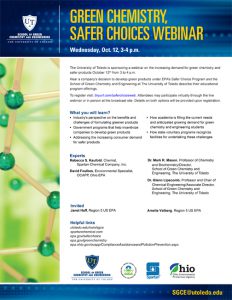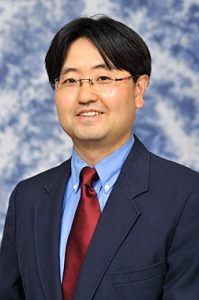Archive for October, 2016
Engineering faculty helps science center get early education grant
Wednesday, October 12th, 2016By GEOFF BURNS | BLADE STAFF WRITER
Toledo’s Imagination Station received more than $300,000 Tuesday to help with early childhood education in science, technology, engineering, and math.
U.S. Rep. Marcy Kaptur (D., Ohio) was at the museum to award the $311,676 grant from the Institute of Museum and Library Services.
Miss Kaptur said the award was one of only 13 granted from a national field of 60 applicants.
“There are many places in our country that have no Imagination Station,” she said. “There are many places that have no Toledo Zoo, there are many places that have no Toledo Museum of Art. If we look at our legacy, those who came before and those who give generously now really says a lot about this place we call home. This is coming at a great time for Imagination Station and a time when our young children in this community need some extra help across the board.”
Lori Hauser, chief executive officer of the Imagination Station, said the grant will help expand existing programming and set up a program shared with other facilities nationwide once it is finished within the next several years.
Ms. Hauser said middle-class parents have conversations with their preschool children five times more than families in poverty do.
“Every child going into kindergarten should have those same sets of opportunities and skill sets, so we would like to see the programming we’re able to set with parents help everyone across Lucas County first and then on a national level,” Ms. Hauser said.
The grant’s goal is to promote meaningful play for preschoolers, to create interaction between parents or caregivers and children, and to offer tools that can be used in learning facilities.
The grant will allow Imagination Station to launch Toddler Tuesday, quarterly science nights, and after-school programming.
In addition, the grant will let Imagination Station work with the University of Toledo to develop family packs that focus on vocabulary skills. The museum also will work with the Toledo-Lucas County Public Library to choose monthly book selections to encourage literacy.
“It’s trying to prepare a child with a well-rounded base of knowledge to set them up for success,” Miss Kaptur said.
Charlene Czerniak, research and engineering professor at UT, said many jobs require a solid foundation in science, technology, engineering, and math, making it important to teach children hands-on skills at a young age.
“We really know we have to start with young children,” Ms. Czerniak said, adding the grant will allow children and their parents or caregivers to get involved in science and engineering practices, and to help children who are curious about a subject. “[Children] are so curious about the world, so it’s a fun way to get young children learning the knowledge and skills that are needed.”
Miss Kaptur said these programs will help the region’s children arrive at kindergarten ready to learn.
“We have our work cut out for us in helping our youth develop in those early years,” Ms. Kaptur said. “Children are full of questions when they’re very young. This is meant to pique their curiosity and to lead them to adventures in learning about science.”
Ms. Hauser said Imagination Station’s partners in the programs related to the grant include Toledo-Lucas County Public Library, Aspire, the University of Toledo, Polly Fox Academy, Summit YMCA Head Start, and the Early Learners Collaborative.
Contact Geoff Burns at: gburns@theblade.com or 419-724-6110.
Green chemistry, safer products to be discussed during Oct. 12 webinar
Tuesday, October 11th, 2016By Carly Wiegand
UT and the School of Green Chemistry and Engineering are sponsoring a webinar on the increasing demand for green chemistry and safer products. It will take place Wednesday, Oct. 12, from 3 to 4 p.m. in the Nitschke Hall SSOE Seminar Room.
The School of Green Chemistry and Engineering is partnering with the U.S. Environmental Protection Agency, the Ohio EPA and Spartan Chemical for this event.
 This webinar will showcase a company’s decision to develop green products under the EPA’S Safer Choice Program.
This webinar will showcase a company’s decision to develop green products under the EPA’S Safer Choice Program.
“Consumers are seeking to live more sustainably through life style choices and the use of green products,” said Dr. Glenn Lipscomb, UT professor and chair of chemical and environmental engineering, who helped organize the webinar. “However, sometimes it is not clear what labeling something green means. The webinar will help educate participants on what the Safer Choice label means and the requirements for products to receive it.”
In addition, members of the School of Green Chemistry and Engineering will describe their educational programs.
Hosting this webinar will provide regional and national visibility to UT’s programs in green chemistry and engineering, according to Dr. Mark Mason, professor of chemistry and director of the School of Green Chemistry and Green Engineering.
“The mission of the school is to improve the human condition through research, education and outreach activities that promote safe and sustainable use, production and recycle of chemical materials,” Mason said.
To register visit tinyurl.com/saferchoiceweb. Attendees may participate virtually through the live webinar or in person at the broadcast. Details on both options will be provided upon registration.
For more information, email sgce@utoledo.edu.
Researcher receives grant to study removal of algal bloom toxins from drinking water sources
Monday, October 3rd, 2016By Christine Long
The National Science Foundation awarded a civil and environmental engineer at The University of Toledo a $224,937 grant to study a sustainable approach to water treatment and filtering toxins from harmful algal blooms.
Dr. Youngwoo Seo, associate professor of civil engineering and chemical and environmental engineering, will lead the three-year project titled “Engineering Biofilm Dynamics for Cyanotoxins in Biological Water Treatment.”
Seo is seeking to better understand how bacteria works in order to improve the filters that remove harmful toxins from drinking water.
“To protect the public from emerging contaminants like cyanotoxins in drinking water sources, various advanced water treatment processes are considered,” Seo said. “However, these processes commonly require high-energy demand and operation cost with proper waste management. This project is exploring a sustainable treatment approach using bacterially active filters to remove toxins from harmful algal blooms.”
“There could not be a more timely and more important research project to award than this,” Congresswoman Marcy Kaptur said. “Lake Erie is under constant threat of toxic algal blooms, and we need to find a more sustainable way to treat the water. Our entire region — our economic future and our livelihood — relies on ongoing research such as this at The University of Toledo.”
According to the National Science Foundation grant, “Research emphasis will be placed on understanding how the bacterial biofilm formation and activity can be enhanced and maintained by engineered approaches such as bioaugmentation and bio-stimulation in order to improve performances of biological filtration systems for cyanotoxin removal.”


